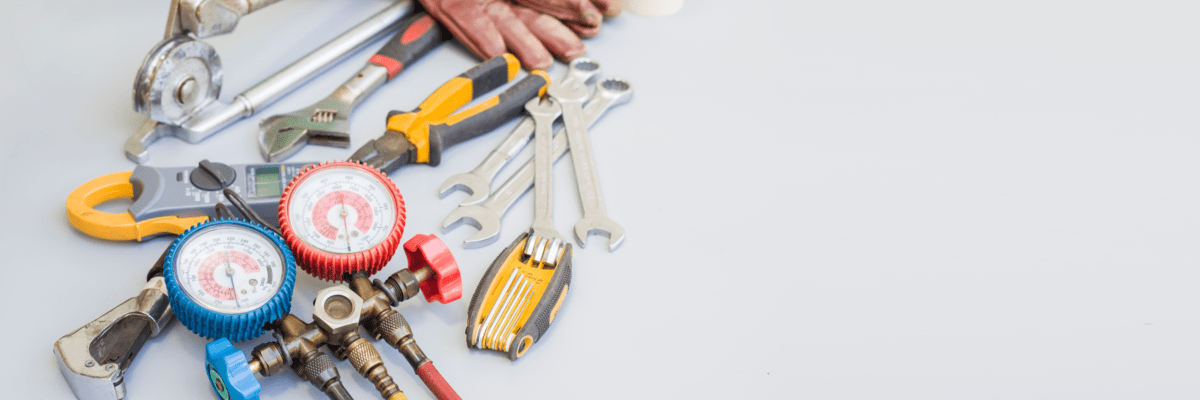Losing tools is frustrating and expensive
HVAC and Refrigeration technicians carry around a valuable stash of tools and equipment every day. Today’s electronic tools are incredibly helpful, but they don’t come cheap: a multimeter costs several hundred dollars and refrigerant leak detectors cost $500 – $1000 or more.
When tools get lost, it’s an expensive problem. Not only does it cost you the price of the tool, but also the wasted time you spend looking for it and then buying a new one. If misplacing tools (or lending them and not getting them back) has become a problem for you, here are 3 strategies that can help you keep track of your tools.
How to keep track of tools: 3 strategies that can help
1. Get organized
You’re more likely to lose tools when your tool bag or box is a mess. You can’t easily see what’s in there, so it may take you a while to realize something is missing… until the next time you go to use it. By then, your chances of finding it may be slim.
Start by choosing a tool box or bag that meets your needs, and organizing your tools so everything has a designated place. It’s faster and easier to put tools away when you don’t have to think about where they go. Make it easy to access the tools and supplies you use the most. At first, you might forget where things go. If that happens, try labeling the slots and pockets to remind you.
Also, don’t limit your tool organization to the ones you carry around. Take the time to organize your van or truck so you can keep track of larger or less-frequently used tools, spare tools, and supplies.
2. Establish good habits
Once you have your tools organized, the trick is to establish good habits so they stay that way, and stay in your possession!
When you’re done with a tool, immediately put it back in your tool storage. We’ve all heard that advice but it’s easier said than done. What about when you’re using several tools at once to work on a repair? It may not be practical to keep taking it in and out of the bag.
There are a couple of ways to keep track of your tools while you’re using them. Some technicians like to use a tool belt to hold tools they are currently using for quick and easy access (while the rest of the tools stay in a bag or box). Another option for those who don’t like wearing a tool belt is to lay out the tools you need for your current task on the floor next to you.
In either case, be mindful of what you do when you switch tools. When you’re concentrating on your task, it’s easy to put a tool down in the wrong place. That’s how you accidentally leave tools behind.
When you’re finished with your job, put everything back in its place in your tool bag or box, and do a quick visual inventory to make sure you have everything. The few minutes you spend doing that can save you time and money later.
Here’s one more tip that can help you keep track of tools borrowed by your coworkers. If somebody borrows a tool, stick a post-it note where that tool goes with the name of the person who borrowed it. If you don’t get it back, you’ll know who has it.
3. Try using tool trackers to keep track of tools
Tools sometimes go missing even with the best organization and habits. For those who need extra help keeping track of tools, there’s technology for that. Tool trackers are small tags that you attach to tools and equipment items, and then you can track their location with an app on your phone.
The most common tool trackers use either Bluetooth or GPS technology to track your items. Bluetooth tool trackers are small (about the size of a coin), relatively inexpensive, and have long battery life (up to 3 years). However, their range is limited to within a building. GPS trackers can provide nearly global coverage, but they are also larger in size, need to be charged much more often, and they require subscription service fees that can be $20 per month or more. That makes GPS trackers impractical for hand tools, but potentially useful for very expensive items, for your entire toolbag, or even for your vehicle.
Here are a couple of popular tool trackers:
Bluetooth tracker: Milwaukee TICK Tool and Equipment Tracker
GPS tracker: Tracki
More helpful information for HVAC & Refrigeration technicians
If you’re building a career in HVAC and Refrigeration service, stay in the know with our helpful articles and videos.
HVACR Career Connect NY was created to promote the exceptional quality-of-life benefits of a career in HVAC and Refrigeration service, and also to provide a clear path for getting started in the profession. In doing so, we serve as a resource for employers in the New York City metro area to find and hire smart and capable new technicians. We also serve as an educational resource to support business growth and to help service technicians succeed in their chosen profession.
